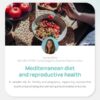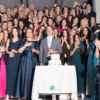Dimitris Michalakis, MD, MSc, Assisted Reproductive Gynecologist. The European Food Safety Authority (EFSA) recommends that women who are trying to conceive, as well as pregnant women, keep their daily caffeine intake below 200 mg, while the World Health Organization (WHO) recommends a daily caffeine intake of less than 300 mg. Caffeine is a central component of coffee, but it is also found in other foods such as tea, soft drinks, chocolate, energy drinks, and some medications.Although there are not many studies, it seems that the consumption of 100-300 mg of caffeine per day does not affect the chances of getting pregnant in women undergoing assisted reproductive treatment, but it is associated with a reduced number of eggs during egg retrieval. In case of pregnancy, consumption of >100-200mg per day is associated with an increased risk of miscarriage.
In men, caffeine intake can also negatively affect fertility. It seems that consuming more than 4 cups of coffee per day can damage the morphology of sperm, while the ability to fertilize is reduced with consumption of more than 3 cups per day. The caffeine that comes from cola drinks seems to have a more harmful effect.
Try to consume 1-2 coffees per day, with 1 teaspoon of coffee!
Choose coffees with a lower caffeine content per serving, such as Greek or espresso!
Here are some additional tips for coffee drinkers who are trying to conceive:
- Talk to your doctor about your coffee habits. They can help you develop a plan to reduce your caffeine intake.
- Set a goal for your caffeine intake and stick to it.
- Tell your friends and family that you are trying to reduce your caffeine intake. They can provide support and encouragement.
- Switch to decaf coffee or other caffeine-free beverages.
- Drink plenty of water to stay hydrated.
- Eat a healthy diet and get regular exercise.
- Reducing your caffeine intake is one of the best things you can do for your health, and it can also improve your chances of getting pregnant.






